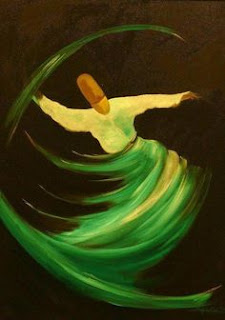Light dawns, and any talk of proof
resembles a blind man’s cane at sunrise. 1
Remember the passage,
We are with you wherever you are.
Come back to that.
When did we ever leave it? 2
No matter we’re in a prison of forgetting
or enjoying the banquet of wisdom,
we are always inside presence. 3a
Drunkenly asleep, tenderly awake,
clouded with grief, laughing like lightning,
angry at war, quiet with gratitude, we are nothing
in this many-mooded world of weather
but a single brushstroke down,
speaking of presence. 3b
*The word Allah in Arabic begins with a strong downward mark.
My thoughts:
I think that this poem has 3 parts to it. I've taken the liberty of numbering each part at its last line. My apologies if it breaks your flow while reading.
Part 1 is beautiful, even though it's just 2 lines. Asking for proof of a Higher Power, that one has been enlightened with, seems like asking for a cane at sunrise, just like a blind man would.
Questions for reflection: Am I 'blind' ? Wouldn't I rather be 'blinded' ?
Part 2 was quite unclear to me. It seems like Rumi is having a dialogue with his students or with one of his spiritual friends (and there were 4 or 5 of them beginning with Shams of Tabriz...they are listed out and mentioned in Coleman Barks' introduction to 'Essential Rumi'). Through the dialogue, he seems to be reminding his readers that the Universe is always with us. Through the assertion of ego, the sense of self as separate from others, we only seem to be challenging that. He exhorts us to return to the idea that the Universe is always with us.
But, I really would like some guidance with this part 2.
Part 3a: Whether we are in the prison of our own ego-asserted world (I did this / I made it happen / I cause and so and only so effects happen) or whether we have transcended that and have become wise, we are always within the realm of the All-Knowing and All-Mighty. (what Rumi calls 'presence'). Once we understand this part 3b seems obvious enough, especially with the help of the asterisked footnote.
.
.
.
.
.
While Rumi's work is quite obviously anchored in spirituality, what makes his poetry alluring is the use of different metaphors (the blind man's cane, the prison of forgetting, the banquet of wisdom...) to bring alive various aspects of it - if only to help the populace internalise spirituality through the reading of his works.
More next week, but in the meantime, we / I would love to hear from you, either here or within the facebook group!
resembles a blind man’s cane at sunrise. 1
Remember the passage,
We are with you wherever you are.
Come back to that.
When did we ever leave it? 2
No matter we’re in a prison of forgetting
or enjoying the banquet of wisdom,
we are always inside presence. 3a
Drunkenly asleep, tenderly awake,
clouded with grief, laughing like lightning,
angry at war, quiet with gratitude, we are nothing
in this many-mooded world of weather
but a single brushstroke down,
speaking of presence. 3b
*The word Allah in Arabic begins with a strong downward mark.
My thoughts:
I think that this poem has 3 parts to it. I've taken the liberty of numbering each part at its last line. My apologies if it breaks your flow while reading.
Part 1 is beautiful, even though it's just 2 lines. Asking for proof of a Higher Power, that one has been enlightened with, seems like asking for a cane at sunrise, just like a blind man would.
Questions for reflection: Am I 'blind' ? Wouldn't I rather be 'blinded' ?
Part 2 was quite unclear to me. It seems like Rumi is having a dialogue with his students or with one of his spiritual friends (and there were 4 or 5 of them beginning with Shams of Tabriz...they are listed out and mentioned in Coleman Barks' introduction to 'Essential Rumi'). Through the dialogue, he seems to be reminding his readers that the Universe is always with us. Through the assertion of ego, the sense of self as separate from others, we only seem to be challenging that. He exhorts us to return to the idea that the Universe is always with us.
But, I really would like some guidance with this part 2.
Part 3a: Whether we are in the prison of our own ego-asserted world (I did this / I made it happen / I cause and so and only so effects happen) or whether we have transcended that and have become wise, we are always within the realm of the All-Knowing and All-Mighty. (what Rumi calls 'presence'). Once we understand this part 3b seems obvious enough, especially with the help of the asterisked footnote.
.
.
.
.
.
While Rumi's work is quite obviously anchored in spirituality, what makes his poetry alluring is the use of different metaphors (the blind man's cane, the prison of forgetting, the banquet of wisdom...) to bring alive various aspects of it - if only to help the populace internalise spirituality through the reading of his works.
More next week, but in the meantime, we / I would love to hear from you, either here or within the facebook group!

To me, from the third line to the end Rumi was talking about the present moments. For example "We are with you wherever you are" 'We' means the 'present moments'. No matter whether we forget it or do whatever, we are always present in the present moment, not in the past or in the future. We can only use present moments to do or find something meaningful.
ReplyDelete